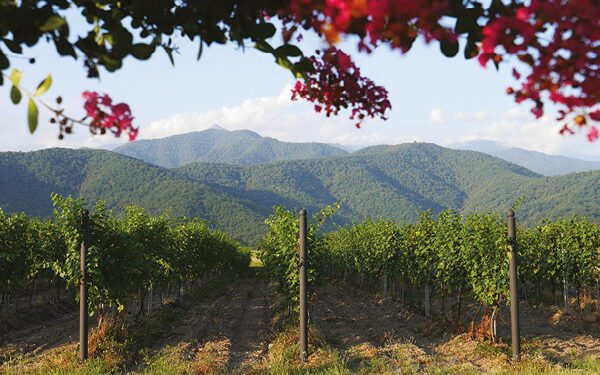Home
Analysis & Insights

Published: 26 August, 2024
Arguably the birthplace of wine, Georgian winemaking is steeped in tradition and, as James Lawrence explains, has much to offer UK consumers.
In the 21st century, Georgia’s eclectic palate of wine styles has become familiar to a new generation of consumers: open-minded, insatiably curious and diverse. It’s about time: the earliest archaeological evidence of viticulture is found in the country and Georgians are born winemakers – they cultivate an exciting range of indigenous grapes on ancient soils.
Wine, you might say, is in their blood. “Our ambition is to help people discover and appreciate Georgian wines. We combine ancient craft techniques with a very modern and dynamic mentality. This helps us to create distinctive wines which appeal to those wanting to try something new and different,” says George Margvelashvili, founder of Tbilvino Wines.
Created in 1962, Tbilvino ownstwo state-of-the-art wineries in Tbilisi (the capital) and the beautiful province of Kvareli in north-east Georgia. Its spectacular vineyards are situated in Kakheti, a historic region found in the eastern half of the country. Spanning the dramatic foothills of the Georgian Caucasus, the varied terrain of Kakheti reveals a mosaic of soil types – including alluvial, clay and gravel terroirs – and a favourable mesoclimate.
According to Margvelashvili: “Tbilvino’s vineyards, located in the subregions Mukuzani, Tsinandali and Kindzmarauli, are 400m above sea level. They offer a variety of soils, including meadow brown, alluvial and stony, contributing to the wines’ distinctive taste profiles and rich aromas.”
↓
Super saperavi
Georgia’s leading viticultural export is undoubtedly Saperavi. Its lively tannins, ripe acidity and savoury complexity make Saperavi a style for the modern age: super-fresh and very balanced.
“Often named the ‘king of Georgian grapes’, Saperavi is now making its mark with wine drinkers all over the world. With more than 46,500 tags on Instagram, our aim is to shine a light on Georgia and our unique winemaking processes within the UK. Some wine writers have even tipped Saperavi to be the new Malbec,” enthuses Margvelashvili.
He continues: “Our winery offers a compelling range of Saperavi wines to showcase the versatility of the grape. The flagship Saparavi, made using 100% Saparavi, highlights the grape’s typical floral aromas, alongside bold flavours of forest fruits. The Qvevris Saperavi, also 100% Saperavi, boasts aromas of ripe cherry and red berries.”
The unique character of local wines – Tbilvino is now the most exported Georgian brand to the UK – has galvanised buyers and sommeliers like never before.
Steve Daniel, head of buying at Hallgarten & Novum Wines, says: “Georgia offers so much as a wine-producing country: it has food-friendly indigenous grape varieties, a great historical backstory and will provide a point of difference on a wine list that a wine merchant or sommelier can talk to guests about.”
Sarah Abbott MW observes that: “We’re at a tipping point for Georgian wine and I think it’s the most thrilling new Old World wine country for buyers looking for great wines, unique stories and compelling cultural resonance.”
She adds: “I first visited Georgia and tasted the wines nine years ago, when I was invited as an international judge to an early edition of the WineExpo annual competition. The rejuvenation and reinvention of Georgian wine I’ve witnessed since then has been dramatic.”
With over eight millennia of history and an inimitable passion for quality, Georgian wine is poised to become a global tour de force.
Q&A: George Margvelashvili, founder, Tbilvino Wines
Georgia is a small country with an ancient wine tradition – does modern technology and innovation play a major role in the industry today?
Known for its ancient winemaking tradition, we create quality wines using the ‘qvevri’ (pronounced ‘k-vevri’) method – where the juice is fermented with the grape skins in giant, egg-shaped clay pots buried in the ground. However, while Tbilvino encompasses these ancient traditional crafts, we combine this with an embrace of innovation and modern technology. For example, our new high-tech, energy-efficient production line, which allows us to produce up to 6,000 bottles an hour, ensuring efficiency without compromising the quality of the wine.
Our commitment to innovation extends beyond bottle production. We have implemented a cutting-edge hail-protection system, which effectively prevents hail damage by emitting a heatwave that extends to a height of 15km, preventing the aggregation of hailstones with 95% efficiency.
How important is sustainability at Tbilvino?
Our sustainability efforts start in the vineyard and go all the way through to bottling, with minimal pesticide use, organic products, and natural pest control and soil fertility techniques. We use pheromones to control European grapevine moth populations and water-conserving drip irrigation systems. Meanwhile, we extend the life of our barrels through regular cleaning and repurpose them after three to four years. To lessen environmental impact, we use lightweight bottles and a new, energy-efficient bottling line that reduces energy usage by 30%.
Finally, Tbilvino is celebrating its 60th anniversary this year. What are your plans for the future?
Our aim is to continue creating distinctive wines that appeal to those wanting to try something new and different. Thus, to celebrate the 60th anniversary, we have introduced a new premium range, showcasing the very best of what Tbilvino has to offer. The collection of eight wines embodies our goals of focusing on crafting quality wines and building on the success of Tbilvino’s world-class Georgian wines with the inclusion of the Mtsvane, Saperavi Rosé, Qvevris Kisi, Aleksandrouli, Saperavi, Qvevris Saperavi, Saperavi Single Vineyard and the Plot #3.
Other articles of interest
Source link : http://www.bing.com/news/apiclick.aspx?ref=FexRss&aid=&tid=66cc2b46785d4f709286154eead98a83&url=https%3A%2F%2Fharpers.co.uk%2Fnews%2Ffullstory.php%2Faid%2F33169%2FHeadline_Heroes%3A_Georgia_92s_grape_revolution.html&c=1804619194582626337&mkt=en-us
Author :
Publish date : 2024-08-25 20:06:00
Copyright for syndicated content belongs to the linked Source.




